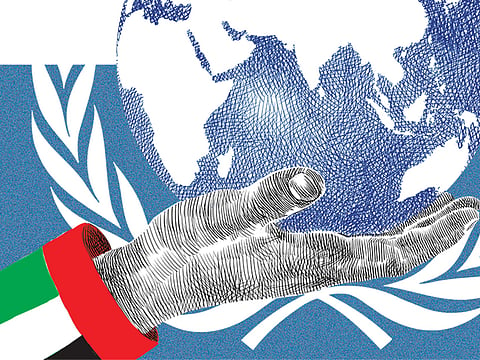The UAE is committed to climate change talks
Country taking action in every field, as outlined in its roadmap to reduce greenhouse gases

The upcoming 21st meeting of the Conference of Parties (COP21) of the United Nations Framework Convention on Climate Change (UNFCCC) in Paris, November 30–December 11, marks a long history of climate change negotiations that spans across more than two decades. At COP 21, an agreement is expected to be reached which will govern global climate actions after 2020 to curb greenhouse gas emissions, the main cause of global warming, in order to reduce adverse impacts of climate change on the society and the environment.
Established in 1992, the UNFCCC set broad objectives to drive actions to tackle climate change based on mounting scientific evidence that climate change is being caused by human induced greenhouse gas emissions. It stated that all countries are part of the solution, but that developed countries — nations that have historically emitted the largest share of greenhouse gas emissions — have a responsibility to take the lead on climate mitigation actions and to support developing countries affected by impacts of climate change such as increased extreme weather events, flooding and drought, but with limited resources to cope. The UNFCCC, however, did not set any emissions reduction targets or contain any enforcement mechanisms.
But that changed in 1997 with the agreement of the Kyoto Protocol, which set legally binding emission targets for developed countries from 2008 to 2012. While the United States, the world’s largest emitter at the time, did not ratify, the Kyoto Protocol did produce meaningful actions, most notably from European countries.
More than a decade later, the international climate regime changed significantly, moving away from requiring legally binding targets that only apply to developing countries to calling for voluntary actions by all countries.
The Kyoto Protocol was extended to 2020 with new targets in 2012, although the European Union was the only large emitter that ratified the Protocol, thus significantly weakening its effectiveness. At the same time, a broad agreement was reached that created mechanisms that acknowledges all nations — developed and developing — voluntary climate actions, as the result of increasing of greenhouse gas emissions from developing countries and emerging economies.
With this changing landscape, countries have agreed that after 2020, there should be a new legal agreement that will apply to all countries and will allow countries to take climate actions according to their own national circumstances and priorities.
Many questions remain as the world attempts to curb the effects of climate change. For example, should the world set an overall goal that keeps global temperatures from rising more than 2 degrees above pre-industrial levels which is considered as the safe limit? How should countries be required to demonstrate the progress they are making in implementing their actions? What support, such as finance or technology, should be provided to help developing countries?
While these questions are politically difficult, there is good news to report. Today, the list of nations standing up and committing to climate action is impressive and creates real momentum that carries us into Paris.
Nearly every country in the world, including the UAE, has presented an Intended Nationally-Determined Contribution (INDC) plan — an outline of what the actions nations aim to take to combat climate change ahead of COP 21. Each country is framing its climate actions in a way that makes sense at home and that contribute to a global effort.
The UAE is taking action in every significant field, as outlined in our own INDC.
Reinforcing the country’s contributions to climate action is a national target of 24 per cent from clean-energy sources by 2021, nuclear and renewable. We also have ambitious efficiency programmes, including green-building codes and mandatory standards for cooling and lighting equipment. We are developing Carbon, Capture, Usage and Storage technology — which safely buries emissions underground — and actively protecting our natural assets, such as the mangrove forests that retain and sequester carbon dioxide. But most importantly, we are not just investing in technology today, but building the opportunities of the future with world-class educational institutions such as the Masdar Institute and UAE University
All of our initiatives are driven by a focus on practical solutions that create jobs and economic opportunities for our people as well as improving the environment that we live in. But they also put us at the forefront of list of countries to support international efforts to solve climate change.
We are also already active in negotiations leading up to Paris. Throughout the year, we have been active in supporting the French Government, who will be hosting COP 21, joining a number of ministerial discussions as well as co-convening dialogue with French Foreign Minister Laurent Fabius.
This December, the UAE is committed and prepared to work with other nations to find viable, real-world solutions to address climate change. We will build upon the approach that welcomes diverse actions that take into account national -priorities. And the UAE believes a new agreement should be ambitious yet flexible, and recognise special circumstances for developing countries who are experiencing rapid economic and social growth. Climate action should embrace development, not hinder it.
Our delegation to Paris — which includes a diverse range of stakeholders, from official negotiators and private companies to students — is ready to show the world our commitment to climate action.
We can’t afford to fail, but more importantly, we cannot afford to waste the opportunity to act. Climate action is a powerful engine to spur new economic sectors and secure vital resources. Action will fortify our role as a steadfast partner to the world.
Dr Thani Al Zeyoudi, UAE Permanent Representative to IRENA and Director of Energy and Climate, Ministry of Foreign Affairs


